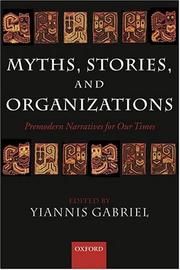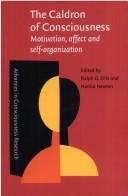| Listing 1 - 3 of 3 |
Sort by
|
Periodical
ISSN: 08935483 ISBN: 9780203779613 Year: 1985 Publisher: New York, N.Y. : Guilford Press
Abstract | Keywords | Export | Availability | Bookmark
 Loading...
Loading...Choose an application
- Reference Manager
- EndNote
- RefWorks (Direct export to RefWorks)
Self psychology --- Ego (Psychology) --- Ego. --- Psychologie du soi --- Moi (Psychologie) --- Self psychology. --- Self --- Egos --- Psychology --- Identity (Psychology) --- Personality --- Psychoanalysis --- Ego

ISBN: 0199264473 0199264481 0191555827 1280756659 1423768051 9780191555824 9781280756658 Year: 2004 Publisher: Oxford : Oxford university press,
Abstract | Keywords | Export | Availability | Bookmark
 Loading...
Loading...Choose an application
- Reference Manager
- EndNote
- RefWorks (Direct export to RefWorks)
Each chapter of this book takes as its starting point a myth, a legend, a story or a fable, and explores its contemporary relevance for a world of globalization, organizations and, consumerism. Each contributor is inspired by a relatively short but rich text which is then used as a springboard for an analysis of contemporary social and organizational realities. The idea behind this book is that by looking at contemporary society through the prism of pre-modern narratives, certain features emerge in sharp relief, while others are found to be entrenched in societies across the ages. The texts that have inspired the authors of this collection differ - some are myths, some are stories, one is a children's tale. The origins of these texts differ, from the scriptural to the folkloric, from high art to oral tradition. What all the texts have in common is a distinct and compelling plot, a cast of recognizable characters with an ability to touch us and speak to us through the ages, and, above all, a powerful symbolic aura, one that makes them identifiable landmarks in storytelling tradition. The driving force behind this project was each author's love for their narratives.; It is not an exaggeration to say that the book is a true labour of love. The chapters are introduced by the editor and are arranged in four parts, each with it own introduction. The chapters in each part spring from stories that share a narrative character, and are labelled as Knowledge Narratives, Heroic Narratives, Tragic Narratives, and Reflecive Narratives. The book offers a set of probing, original and critical inquiries into the nature of human experience knowledge and truth, the nature of leadership, power and heroic achievement, postmodernity and its discontents, and emotion, identity and the nature of human relations in organizations. Different chapters deal, among other things, with the nature of leadership in the face of terrorism, friendship, women's position in organizations, the struggle for identity, the curse of insatiable consumption and the ways the hero and heroine are constructed in our times.
Storytelling. --- Organizational behavior. --- Management --- Art de conter --- Comportement organisationnel --- Gestion --- Philosophy. --- Philosophie --- Organizational behavior --- Storytelling --- Story-telling --- Telling of stories --- Oral interpretation --- Children's stories --- Folklore --- Oral interpretation of fiction --- Behavior in organizations --- Organization --- Psychology, Industrial --- Social psychology --- Philosophy --- Performance --- organizational studies --- myths --- premodern narratives --- EGOS --- E-books

ISSN: 1381589X ISBN: 9027251363 1556191960 9781556191961 1282254901 0585461201 9786612254901 902729996X 9789027251367 9780585461205 9789027299963 9781282254909 6612254904 Year: 2000 Volume: 16 Publisher: Amsterdam Philadelphia J. Benjamins Pub. Co.
Abstract | Keywords | Export | Availability | Bookmark
 Loading...
Loading...Choose an application
- Reference Manager
- EndNote
- RefWorks (Direct export to RefWorks)
From a neuropsychological perspective, awareness of emotions is a complex function involving several components (perceptual decoding and conceptualization, memory and attention, and psychophysiological responses). Pathological conditions of the nervous system as well as certain experimental procedures in healthy persons may induce dissociations of these components. It is suggested that perceptual awareness of an emotional stimulus requires a correct stimulus identification as well as input monitoring. Awareness of experiential qualities is a more global function involving integration of interoceptive information, formation of emotional schemas or concepts, and recall of episodic memory of past emotions. Perceptual awareness of internal or external stimulus events can be defined and measured by means of psychophysical methods. Experiental qualities, however, are difficult to assess in a reductionist/physicalist framework.
Cognitive psychology --- Philosophical anthropology --- Consciousness --- Emotions --- Motivation (Psychology) --- Self-organizing systems --- Conscience --- Motivation (Psychologie) --- Systèmes auto-organisés --- Emotional Intelligence --- Behavior and Behavior Mechanisms --- Psychophysiology --- Personality Development --- Cognition --- Psychoanalytic Theory --- Mental Processes --- Intelligence --- Psychological Theory --- Personality --- Ego --- Motivation --- Social Sciences --- Psychology --- Feelings --- Human emotions --- Passions --- Affect (Psychology) --- Affective neuroscience --- Apathy --- Pathognomy --- Disincentives --- Expectations --- Incentives --- Disincentive --- Expectation --- Incentive --- Motivations --- Drive --- Self --- Egos --- Apperception --- Mind and body --- Perception --- Philosophy --- Spirit --- Personalities --- Human Characteristics --- Psychologic Theory --- Psychological Theories --- Theories, Psychological --- Theory, Psychological --- Social Cognitive Theory --- Cognitive Theories, Social --- Cognitive Theory, Social --- Psychologic Theories --- Social Cognitive Theories --- Theories, Psychologic --- Theories, Social Cognitive --- Theory, Psychologic --- Theory, Social Cognitive --- Human Information Processing --- Information Processing, Human --- Psychoanalytical Theory --- Theory, Psychoanalytic --- Oral Character --- Character, Oral --- Characters, Oral --- Oral Characters --- Psychoanalytic Theories --- Psychoanalytical Theories --- Theories, Psychoanalytic --- Theories, Psychoanalytical --- Theory, Psychoanalytical --- Cognitive Function --- Cognitions --- Cognitive Functions --- Function, Cognitive --- Functions, Cognitive --- Development, Personality --- Child Development --- Growth --- Mind-Body Relationship (Physiology) --- Physiologic Psychology --- Physiological Psychology --- Psychology, Physiologic --- Mind-Body Relations (Physiology) --- Psychology, Physiological --- Mind Body Relations (Physiology) --- Mind Body Relationship (Physiology) --- Mind-Body Relation (Physiology) --- Mind-Body Relationships (Physiology) --- Physiologic Psychologies --- Psychologies, Physiologic --- Relation, Mind-Body (Physiology) --- Relations, Mind-Body (Physiology) --- Relationship, Mind-Body (Physiology) --- Relationships, Mind-Body (Physiology) --- Psychosomatic Medicine --- Mind-Body Relations, Metaphysical --- Behavior And Behavior Mechanism --- Social Intelligence --- Emotional Intelligences --- Intelligence, Emotional --- Intelligence, Social --- Intelligences, Emotional --- Intelligences, Social --- Social Intelligences --- Interpersonal Relations --- Learning systems (Automatic control) --- Self-optimizing systems --- Cybernetics --- Intellect --- Learning ability --- Synergetics --- Action, Psychology of --- Drive (Psychology) --- Psychology of action --- Consciousness. --- Emotions. --- Self-organizing systems.
| Listing 1 - 3 of 3 |
Sort by
|

 Search
Search Feedback
Feedback About UniCat
About UniCat  Help
Help News
News